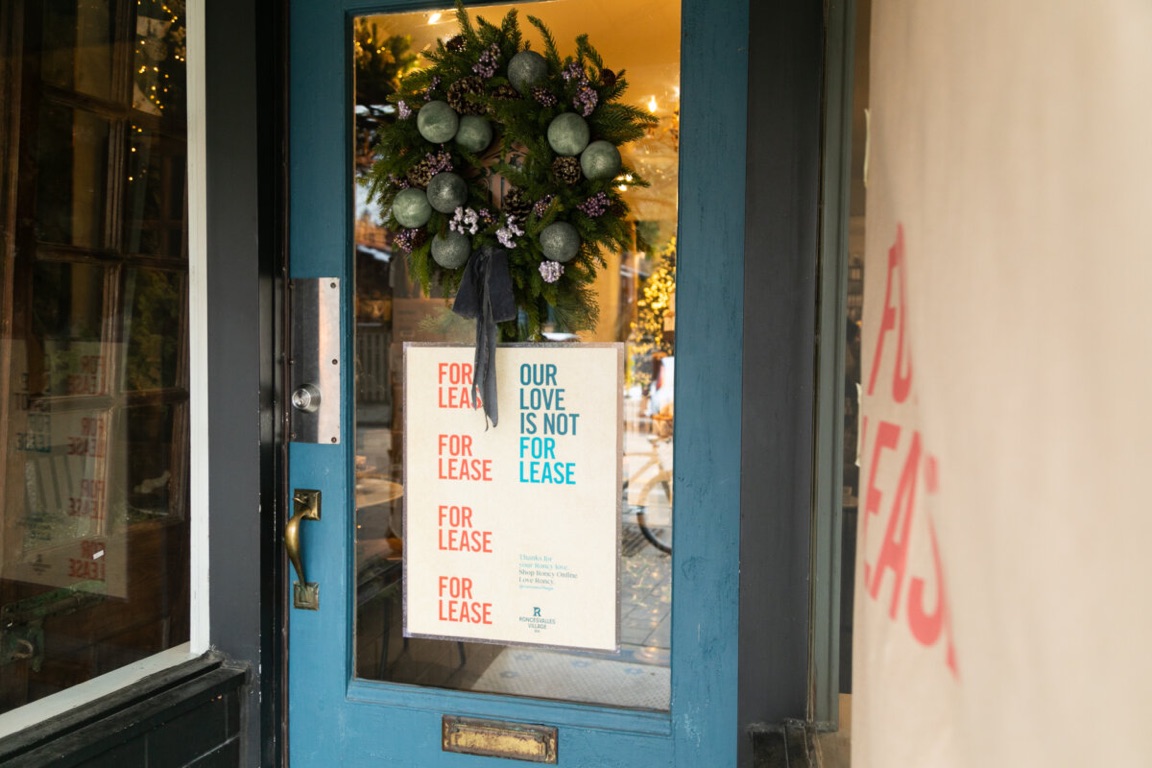[vc_row][vc_column][vc_column_text]
Friday Fix is a weekly feature of all the things you should know before heading into the weekend.
[/vc_column_text][vc_separator style=”dotted” border_width=”2″][vc_custom_heading text=”Business” use_theme_fonts=”yes”][vc_column_text]Roncesvalles has a message for the rest of Toronto: Shop local, or else.
Supporting local businesses has never been more important. As lockdown restrictions continue to close the doors of small businesses across the country, Roncesvalles BIA is showing its community what’s at stake with the NOT FOR LEASE campaign.
“We were looking for a holiday campaign that was not just a simple ‘Season’s Greetings!’ because this year is not simple or ordinary,” said Adam Langley, Vice-Chair of the Roncesvalles BIA. “We had to do something a little more innovative.”
Working with advertising agency The Local Collective, the Roncesvalles BIA turned their neighbourhood’s main street into what could become a grim reality if local stores went out of business. Storefronts are covered by ‘For Lease’ signs; a stark difference to the usually vibrant street. While the storefronts being ‘For Lease’ may not be true, it boldly displays what is at risk.[/vc_column_text][vc_row_inner][vc_column_inner][vc_single_image image=”20695″ img_size=”full” add_caption=”yes”][/vc_column_inner][/vc_row_inner][vc_row_inner][vc_column_inner][vc_column_text]Langley notes that independent businesses have had a year-long struggle to stay afloat, and the campaign is meant to show how the main streets of Toronto are struggling. He commends the Roncesvalles community for stepping up throughout the pandemic, and says their support is part of the reason why this campaign is so effective.
“Our community does support local,” said Langley. “We’re in a position where we can send that message out across Toronto: Main streets are going to struggle during this time. We all need to do our part to maintain those businesses.”
He urges consumers to turn to small businesses for gifting this holiday season. Even this past weekend, Langley’s family almost bought a book off of Amazon, before stopping to check in with their local bookstore for the purchase, “It took maybe 30 seconds longer, but it makes a big impact.”
If a look at the Roncesvalles main street covered in FOR LEASE signs makes you anxious and sad—which it should—do your part to keep your own neighbourhood lively and thriving this holiday season. Shop local.[/vc_column_text][/vc_column_inner][/vc_row_inner][vc_custom_heading text=”Fashion” use_theme_fonts=”yes”][vc_column_text]Much of Ontario got its first taste of winter with low temperatures and a heavy snowfall earlier this week. Although there may not be much commuting this year, you’re sure to need a jacket for when you do happen to leave the house.
We’ve rounded up our favourite Canadian brands to keep you warm this winter. Read more here.[/vc_column_text][vc_single_image image=”20688″ img_size=”full”][vc_custom_heading text=”Need to Know” use_theme_fonts=”yes”][vc_column_text]This past year, every workplace, across every industry was affected by the COVID-19 pandemic. There have been some obvious changes: working from home, job losses and e-commerce surging to name a few. There are also some trends across the workplace that have gone under the radar.
According to the 2020 Canadian HR Benchmark Report by Humi, Canadians took 40 percent less time off in 2020, compared to 2019. In addition, the average Canadian salary has dropped 4.5 percent since the pandemic began.
Andrea Bartlett, Humi’s HR Director, offered some insight as to why Canadians might not be taking vacation time despite 2020 being one of the most challenging years in recent memory.
“During the beginning of COVID-19 and the very messy transition that many businesses had to go through, many people were laid off. So, people were happy to have a job and there was a reluctance to take time off” said Barlett. “Now that some normalcy has been restored, it’s year end.”
She added that historically, people viewed vacation time as a luxury of sorts and would use it for travel—with global lockdowns, that’s not happening anymore. While travel might not be possible, she stresses that it’s still important for employees to be taking time off, and that vacation time doesn’t need to translate into an actual vacation.
“Vacation is about allowing employees to unplug and re-engage with things outside of their work life,” said Bartlett. “It’s really concerning that we’ve seen a 40 percent decline.”
As for the 4.5 percent drop in the average Canadian’s salary, Bartlett says that high salary workers being laid off across all industries due to COVID-19 is a main factor. As well as a general trend of laying off salaried employees before hourly employees.
The discussion of salaries can be uncomfortable—especially in the middle of a global pandemic—as some employees can begin to feel overworked and underpaid; performance reviews may be awkward in the coming months.
Bartlett says that the data suggests many companies are having a conservative approach to salary increases, but reminds employees that compensation can come in many forms.
“I really encourage people to understand what other elements, other than salary, are important to you,” said Barlett. “You can talk about a change in your bonus percentage eligibility. Maybe there’s company stock that you can be granted or eligible for, that you weren’t previously eligible for. Maybe vacation time is a priority or professional training and development.”
As workplaces continue to navigate these challenging and ever changing times, Bartlett stresses that employees need to feel empowered in their position—the latest Humi report can help them feel armed with the information they need.
Find out where the Canadian workforce stands (including a less than impressive number of women in c-suite positions). Read the full report here.[/vc_column_text][vc_separator style=”dotted” border_width=”2″][/vc_column][/vc_row]












